Njengamartin399
On this page, you find all documents, package deals, and flashcards offered by seller njengamartin399.
- 141
- 0
- 7
Community
- Followers
- Following
148 items
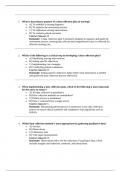
ch. 14. Designing and implementing a data collection plan
1. What is the primary purpose of a data collection plan in nursing? o A) To establish a nursing diagnosis o B) To organize the assessment process o C) To implement nursing interventions o D) To evaluate patient outcomes Correct Answer: B Rationale: A data collection plan is primarily designed to organize and guide the assessment process, ensuring that relevant and comprehensive data is collected for effective nursing care. ________________________________________ 2. Which of the followi...
- Exam (elaborations)
- • 16 pages •
1. What is the primary purpose of a data collection plan in nursing? o A) To establish a nursing diagnosis o B) To organize the assessment process o C) To implement nursing interventions o D) To evaluate patient outcomes Correct Answer: B Rationale: A data collection plan is primarily designed to organize and guide the assessment process, ensuring that relevant and comprehensive data is collected for effective nursing care. ________________________________________ 2. Which of the followi...
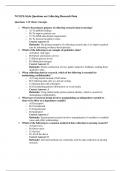
pt. 4. Collecting research data
1. What is the primary purpose of collecting research data in nursing? o A) To publish findings o B) To improve patient care o C) To fulfill educational requirements o D) To increase hospital revenue Correct Answer: B Rationale: The primary purpose of collecting research data is to improve patient care by informing evidence-based practice. 2. Which of the following is an example of qualitative data? o A) Patient vital signs o B) Patient satisfaction surveys o C) Blood glucose levels o...
- Exam (elaborations)
- • 13 pages •
1. What is the primary purpose of collecting research data in nursing? o A) To publish findings o B) To improve patient care o C) To fulfill educational requirements o D) To increase hospital revenue Correct Answer: B Rationale: The primary purpose of collecting research data is to improve patient care by informing evidence-based practice. 2. Which of the following is an example of qualitative data? o A) Patient vital signs o B) Patient satisfaction surveys o C) Blood glucose levels o...
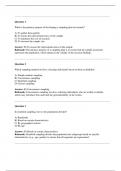
ch. 13. Developing a sampling plan
What is the primary purpose of developing a sampling plan in research? A) To gather data quickly B) To ensure the representativeness of the sample C) To minimize the cost of research D) To increase the sample size Answer: B) To ensure the representativeness of the sample Rationale: The primary purpose of a sampling plan is to ensure that the sample accurately represents the population, which enhances the validity of the research findings. ________________________________________ Question...
- Exam (elaborations)
- • 21 pages •
What is the primary purpose of developing a sampling plan in research? A) To gather data quickly B) To ensure the representativeness of the sample C) To minimize the cost of research D) To increase the sample size Answer: B) To ensure the representativeness of the sample Rationale: The primary purpose of a sampling plan is to ensure that the sample accurately represents the population, which enhances the validity of the research findings. ________________________________________ Question...
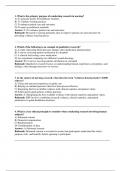
ch .12. Undertaking research for specific purposes
1. What is the primary purpose of conducting research in nursing? A) To generate profits for healthcare facilities B) To validate existing practices C) To enhance patient care and outcomes D) To meet accreditation standards Answer: C) To enhance patient care and outcomes Rationale: Research in nursing primarily aims to improve patient care and outcomes by providing evidence-based practices. ________________________________________ 2. Which of the following is an example of qualitative re...
- Exam (elaborations)
- • 16 pages •
1. What is the primary purpose of conducting research in nursing? A) To generate profits for healthcare facilities B) To validate existing practices C) To enhance patient care and outcomes D) To meet accreditation standards Answer: C) To enhance patient care and outcomes Rationale: Research in nursing primarily aims to improve patient care and outcomes by providing evidence-based practices. ________________________________________ 2. Which of the following is an example of qualitative re...
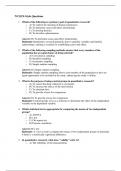
ch. 11. Enhancing rigor in quantitative research
1. Which of the following is a primary goal of quantitative research? o A) To explore the meaning of human experiences o B) To determine cause-and-effect relationships o C) To develop theories o D) To describe a phenomenon Answer: B) To determine cause-and-effect relationships Rationale: Quantitative research primarily aims to quantify variables and identify relationships, making it essential for establishing cause-and-effect. 2. Which of the following sampling methods ensures that every ...
- Exam (elaborations)
- • 15 pages •
1. Which of the following is a primary goal of quantitative research? o A) To explore the meaning of human experiences o B) To determine cause-and-effect relationships o C) To develop theories o D) To describe a phenomenon Answer: B) To determine cause-and-effect relationships Rationale: Quantitative research primarily aims to quantify variables and identify relationships, making it essential for establishing cause-and-effect. 2. Which of the following sampling methods ensures that every ...
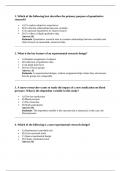
ch. 10. Designing quantitative studies
1. Which of the following best describes the primary purpose of quantitative research? • A) To explore subjective experiences • B) To describe relationships between variables • C) To generate hypotheses for future research • D) To collect in-depth qualitative data Answer: B) Rationale: Quantitative research aims to examine relationships between variables and often focuses on measurable, numerical data. ________________________________________ 2. What is the key feature of an expe...
- Exam (elaborations)
- • 17 pages •
1. Which of the following best describes the primary purpose of quantitative research? • A) To explore subjective experiences • B) To describe relationships between variables • C) To generate hypotheses for future research • D) To collect in-depth qualitative data Answer: B) Rationale: Quantitative research aims to examine relationships between variables and often focuses on measurable, numerical data. ________________________________________ 2. What is the key feature of an expe...
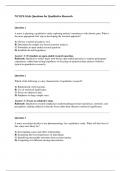
ch. 9. Developing an approach for a qualitative study
Question 1 A nurse is planning a qualitative study exploring patients' experiences with chronic pain. What is the most appropriate first step in developing the research approach? A) Choose a statistical analysis tool. B) Determine the sample size based on power analysis. C) Formulate an open-ended research question. D) Establish the null hypothesis. Answer: C) Formulate an open-ended research question. Rationale: Qualitative studies begin with broad, open-ended questions to explore par...
- Exam (elaborations)
- • 22 pages •
Question 1 A nurse is planning a qualitative study exploring patients' experiences with chronic pain. What is the most appropriate first step in developing the research approach? A) Choose a statistical analysis tool. B) Determine the sample size based on power analysis. C) Formulate an open-ended research question. D) Establish the null hypothesis. Answer: C) Formulate an open-ended research question. Rationale: Qualitative studies begin with broad, open-ended questions to explore par...
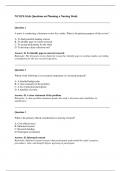
ch. 8. Planning a nursing study
Question 1 A nurse is conducting a literature review for a study. What is the primary purpose of this review? A. To find potential funding sources B. To identify gaps in current research C. To recruit participants for the study D. To develop a data collection tool Answer: B. To identify gaps in current research Rationale: The literature review helps the researcher identify gaps in existing studies, providing a foundation for the new research question. ____________________________________...
- Exam (elaborations)
- • 21 pages •
Question 1 A nurse is conducting a literature review for a study. What is the primary purpose of this review? A. To find potential funding sources B. To identify gaps in current research C. To recruit participants for the study D. To develop a data collection tool Answer: B. To identify gaps in current research Rationale: The literature review helps the researcher identify gaps in existing studies, providing a foundation for the new research question. ____________________________________...
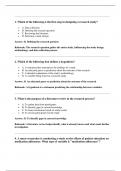
pt. 3. Designing a study to generate evidence for nursing
1. Which of the following is the first step in designing a research study? • A. Data collection • B. Defining the research question • C. Reviewing the literature • D. Selecting a study design Answer: B. Defining the research question Rationale: The research question guides the entire study, influencing the study design, methodology, and data collection process. ________________________________________ 2. Which of the following best defines a hypothesis? • A. A statement that s...
- Package deal
- Exam (elaborations)
- • 20 pages •
1. Which of the following is the first step in designing a research study? • A. Data collection • B. Defining the research question • C. Reviewing the literature • D. Selecting a study design Answer: B. Defining the research question Rationale: The research question guides the entire study, influencing the study design, methodology, and data collection process. ________________________________________ 2. Which of the following best defines a hypothesis? • A. A statement that s...
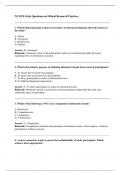
ch. 7. Generating research evidence ethically
1. Which ethical principle requires researchers to inform participants about the nature of the study? A. Justice B. Autonomy C. Beneficence D. Fidelity Answer: B. Autonomy Rationale: Autonomy refers to the participant's right to be informed and make decisions regarding their involvement in research. ________________________________________ 2. What is the primary purpose of obtaining informed consent from research participants? A. To ensure the researcher has funding B. To protect th...
- Package deal
- Exam (elaborations)
- • 18 pages •
1. Which ethical principle requires researchers to inform participants about the nature of the study? A. Justice B. Autonomy C. Beneficence D. Fidelity Answer: B. Autonomy Rationale: Autonomy refers to the participant's right to be informed and make decisions regarding their involvement in research. ________________________________________ 2. What is the primary purpose of obtaining informed consent from research participants? A. To ensure the researcher has funding B. To protect th...
